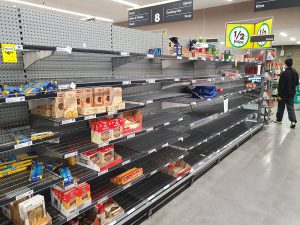Before and After Moments
Published by: WCET | 5/4/2022
Tags: COVID-19, Disaster Planning/Recovery, Diversity/Equity/Inclusion, Policy
Published by: WCET | 5/4/2022
Tags: COVID-19, Disaster Planning/Recovery, Diversity/Equity/Inclusion, Policy
WCET welcomes Kara Monroe, President and Founder of Monarch Strategies LLC. Today we are continuing the article series on leadership in higher education digital learning. This is the third blog post in the featured series. Enjoy the previous posts: “Shifting from Covid-normal to New Normal” and “The ‘New Normal’ and Reflections on Accessibility.”
Thank you Kara for the thoughtful blog and insights.
~Russ Poulin, WCET
I recently visited New York City for a conference and to catch up with family and friends who live in the area. This was my third or fourth time in the city– all post 9/11. We made a visit to the 9/11 Memorial & Museum on this most recent trip. The stillness of the Memorial located in the middle of New York’s vibrancy always stills me inside for a little while.
For my generation, those “where were you when” moments are defined by questions like:

I got chills as I typed that last sentence. I will never forget standing in the student lounge watching the only television with cable in the building. We watched together as a second plane hit the tower and realized this was an attack and not a horrible accident.
Now, we collectively add to these moments the questions “where were we when our offices shut down for COVID” and “how did we pass the days of that long COVID spring of 2020 that seemed to drag on forever.” I remember when Walt Disney World announced it would close and cruise lines ceased operations. Things definitely changed that day.
We started this series with a perspective on “New Normal.” Some have properly questioned whether we should call what we are experiencing now a “new normal.” It’s a good question and one I grappled with as we named the article series.The Oxford dictionary offers the following definition of normal:
“The usual, average, or typical state or condition.”
Usual, average, or typical doesn’t mean it’s right or good–it’s simply what we expect.Through the lens of what we expect to happen (based on what has happened in the past), I’d like to shift attention and explore the possibility that we might never go back to pre-COVID normal again.

By the time this blog is published, I will have left the U.S. twice–both times on cruise ships–and flown four times since March 2020. This is far less than my norm, although I’m starting to catch up relatively quickly to my pre-COVID travel days. However, travel looks much, much different now. For example, my traveling pre planning has changed in the following ways:
I’m of the belief that COVID is now simply a part of our days, and it will be a part of the foreseeable future. When I am booking plans, I expect things to change because someone has COVID, something is closed because of COVID, or because someplace can’t be staffed as a result of the way the world has changed due to COVID.
Many campuses have been able to go mask free over the last few months.This is wonderful, and it should also cause us all to pause for a moment and reflect on inclusivity.
Masks should, forever, be welcomed on our campuses. While they were not a part of the broad American experience pre-COVID, they are now a part of the American experience. One way we might see the routine use of masks is during cold and flu season. From here on, might we go so far as to encourage masks during cold and flu season?
We also see a shift with sick leave policies and treatment. A friend who works on a college campus was recently suffering with a weeks-long persistent cough. When she fell ill with COVID, she had a welcoming experience and was encouraged to rest and take the time away she needed. With this lingering non-COVID cold, she tried to take two days off in a row to let her body recover and rest and was chastised.
Sick leave is a part of the benefits package at colleges and universities. During COVID, we expected people to get sick and many institutional leaders were more forgiving of those illnesses and the time away needed to heal. Unfortunately, this compassionate response and flexibility hasn’t seemed to stay in place now that we’re “back to normal.” In my opinion, as a leader, it is the wrong approach to enforce this continual pushing of the busy culture rather than one of the holistic person. Focused effort on key priorities is far more important than chronic busy-ness. How are you as a leader and how is your institution treating those who fall ill now? If you aren’t treating the person and their experience with grace and acceptance, perhaps that policy and your practice requires a new look.
COVID created a space and time for many of us to think clearly as life around us came to a bit of a stop. What do you need to go back and make time and space for as we come out of the depth of the pandemic and you create your new rhythms and establish your new normal? What “usual, average, or typical state or condition” from before COVID do you want back? Which “usual, average, or typical state or condition” needs to change now?
President and Founder, Monarch Strategies LLC